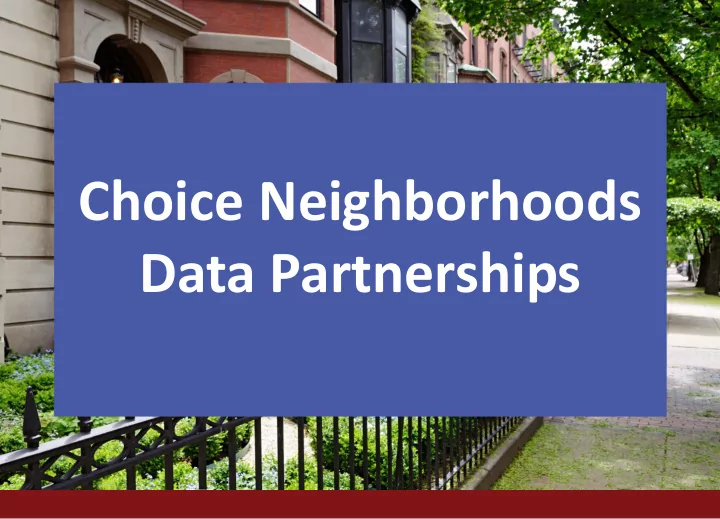

Choice Neighborhoods Data Partnerships
Agenda & Speakers • Speakers: – Jessica Rosenberg, HUD Office of Public Housing Investments, Choice Neighborhoods – Marsha Tonkovich, ICF – Esther Shin, Urban Strategies 2
Agenda • What is a data partnership • Types of data to collect • Data partner agreements • Staffing the data function • Next steps 3
Asking Questions • Webinar will be interactive – please ask questions throughout – Will also have couple of polls • How to ask questions – Verbal questions: Use “raise your hand” function to indicate that you have a question • Please remember to UNMUTE yourself on your phone before speaking – Written questions: Type questions into “Questions” box located on your GoToWebinar panel 4
Choice Neighborhoods Planning Grantees Webinar Series • Choice Neighborhoods webinar series learning objectives – help grantees to: – Organize the community & other partners around shared goals – Establish measurable outcomes for neighborhood revitalization – Evaluate progress & use data to inform on-going work • Upcoming sessions: – Performance Measurement & Management Systems 5
Data Partnerships Defined • Formal partnerships to collect and report information about the status & results in neighborhood • Different than financial or coordinating partnerships – Financial: provide funding to support engagement or initiative – Coordinating: organizations with whom you collaborate but which don’t directly undertake activities/tasks • Even if have an existing partnership, need to consider data task: – May be a different person/department within the existing partner organization that has data expertise and access 6
Poll #1 • What’s the most challenging data partnership you need to establish? Assume that you are the PHA or the PHA is already a part of your team – School district – Police department – Health department – Local university/college – Nonprofit service providers 7
Data Partnerships: Lessons from The Field • What are typically the most difficult types of data partnerships to create? Why? – Data partnerships requiring a significant amount of capacity – Challenge: Staffing/Data Systems – Politically charged data – Challenge: Fear of negative attention – Lessons Learned • Clarity around data collection expectations at the start of the process • Look broadly at potential data partners • Make data be about building capacity and collectively finding solutions • Example: Public safety data 8
Types Of Data To Collect • Four key types of data: – Baseline – Demographic – Outcome – Status • Baseline – In order to show change, must know current status – FIRST, FIGURE OUT WHAT YOU ARE MEASURING – Then, obtain data from partners on current status on each measure – Virtually all outcome measures need a baseline 9
Baseline: Lessons from the Field • What are the challenges with collecting baseline information? Are there selected types of indicators where it is difficult to establish the baseline? If yes, what do you use as a proxy instead? – Individual level data such as school performance (FRPPA and HPPA) • Solution: Data sharing partnership with a school/district or taking a percentage based on enrollment – Data that is collected by zip code & not neighborhood (health) • Solution: Health Impact Assessment performed by FQHCs and clinics – Self reported data collected though surveys • Solution: Requires high resident participation and clarity around the purpose of the data 10
Data Partner Roles & Responsibilities • What are you asking the data partner to do? – Collect and report info to you on a regular basis – Take action if data not received • How enact the data partnership? – Sign an organization to organization MOU/data agreement – Recommend data agreement separate from service or coordinating agreement 11
Data Partner MOU Content • No one right answer but consider: – Roles – What will be reported – Frequency of reporting – How the data will be reported (to who/where, system, etc.) – Privacy policy (personal info) – Process for amending or cancelling the agreement and addressing missed deadlines or data quality 12
Data Partnerships Roles: Lessons from the Field • How can a grantee develop an effective MOU? What does the grantee do if a partner is not reporting their promised data or is reporting bad quality data? – Prior to signing a data agreement consider the following: • Legal obstacles (i.e. confidentiality and organizational bureaucracies) • Clarity on what data is needed, frequency of data reporting, how it will be used, who reviews it and the role of all parties involved • Resources • What will happen if the data needs are not met (a data committee can hold partners accountable as well and identify solutions when there are unexpected data collection challenges) 13
Poll #2 • What have been your biggest challenges in implementing & managing your data partnerships? – Figuring out which partners we need – Getting other organizations interested/involved – The accuracy of the data they report – The timeliness of their reporting – Making sense of the data they send us 14
Staffing the Data Function • Several options for staffing the data collection function – Hire new staff – Assign to existing staff – Contract with a university or nonprofit – Assign to a willing partner • Which of these staffing options have you or will you use? <TYPE YOUR ANSWER INTO THE QUESTIONS BOX> 15
Data Partnerships Staffing: Lessons from the Field • What are some of the creative ways you have seen grantees approach the staffing or roles for the data collection task? What are the typical issues with staffing the data tasks? – University partnerships (mutual evaluation goals) – Data committee with the critical data partners – Find a resource partner early in the process (funders are interested in systems improvement) 16
Closing • Future webinar on performance measurement processes, tools, data systems • Follow-up questions: – HUD Team Coordinator – Marsha.Tonkovich@comcast.net • Next and final webinar: – Performance Measurement and Management Systems, July 14, 2015 from 3pm to 4pm EST 17
Recommend
More recommend